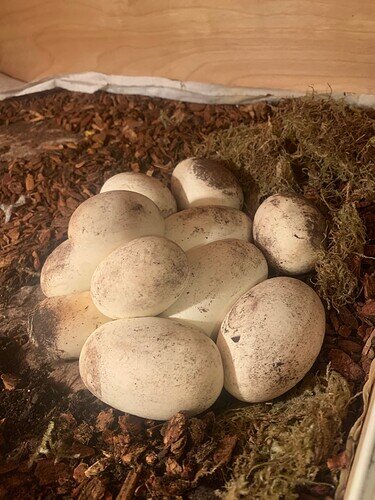I am not sure If I am posting this right I have never posted on this website haha. I have a few snakes balls and boas all in seperate enclosures of course. All females. I have had this female ball python for about 8 years and she has never been bred since i have had her I have never bred her. She went off food for about 4 months, i offered her smaller pray in june and she ate it. So i thought okay maybe she is self regulating her weight. I woke up yesterday to 11 eggs. I have absolutely no idea how she layed these because i have never bred her. I checked a few of them they have veins,I dont want to move them because I am not sure really what to do and i am obviously not prepared or have a incubator because i dont breed and never planned on it lol. So if anyone has any tips for just letting mom maternally incubate them, or just any feed back or tips please let me know! I know people like incubating them and taking them away from mom, but I dont have an incubator and didnt plan this so I am sort of just letting mom do her thing for now. I am just blown away at how this happened because shes 13 years old and I have never put her near a male. Also, my main concern is mom because we both didnt plan this lol so I want to make sure shes healthy and okay before anything.
Considering partho clutches are prone to health issues and high mortality, are you prepared to care for the resultant offspring and possibility of culling any with severe defects? If you try to find any hatchlings homes, they will have to be informed of the fact they are partho and prone to issues/be pet only. If not, i wouldn’t bother trying to hatch them.
Yes! Thank you for your feed back! That is my plan! I honestly dont know if they will hatch but I will most likley keep them anyways if they arnt in poor health and or have issues and will deff not be bred ever.
Remember, because you keep Ball Pythons, you are responsible for them. That said, you did not breed your snakes and didn’t have any intention of producing eggs. Therefore, you have no obligation to incubate this clutch or let them develop to maturity. It would be no different then raising chickens and eating the eggs versus incubating them. (I’m not suggesting eating them) Because there is a better chance of issues given the possibilities with a partho clutch, why put yourself in a position to have to make tough decisions when right now you could simply not facilitate their development. There should be no guilt and in fact, it may be the more responsible path as far as the hobby is concerned and your economic resources. I breed as a hobbyist, but if I were in your situation, I would make the decision not to continue their development. Just my $0.02 and good luck whatever you decide.
Maternal incubation is not too difficult, just make sure you have your temps and humidity dialed in and you should be fine. Odds are mom will not eat while incubating but you can offer a very small meal (like a weanling rat or thereabouts) and she might take it. You also want to make sure she has a ready supply of clean water
As mentioned, partho animals have many health issues and rarely live very long. But, if you are prepared to keep the hatchlings as long as it could take, then you could try incubating them. Keep in mind that if you do decide to incubate them, you will need to care for 11 babies, possibly for many months or years if they don’t sell.
If you decide to incubate them, there are two options, maternal or artificial incubation. If you try maternal incubation just leave them in the enclosure and the mom will take care of them. You could try artificial incubation without an incubator. If you use a storage tub you can put perlite, vermiculite, or moss in the bottom of the container as substrate. If you don’t have any of that you could use a light diffuser over sitting water or paper towels in the bottom. Then, you find a spot in the enclosure that holds good temperatures (85-90*F). Ideally it should be within those temperatures 24/7 but if it drops down a couple degrees lower at night that’s fine.
If your going to let her incubate them id candle them all for the veins and keep your temps and humidty spot on as stated. And be prepared to have to cull some babies we had a partho a few years back horrible sight yo see one made it out of 6 for a few weeks and died unfortunately. We ended up having to pull 3 of the babies out of the eggs cause they was so far over the date and we figured out why i could post pics but they are graffic
I know there are negatives with partho clutches, but I just have to say it’s still pretty cool! A lot of people think they have a partho clutch when in reality it’s from retained from previous years. I know parthenogenesis isn’t exactly as rare as we think, especially with the advancements in husbandry. I have never seen it first hand, or anyone I know either. So very awesome to me! Even if you don’t incubate, or they don’t hatch at least you got to observe this behavior! Nice share!
At least you now know why she wasn’t eating properly!
If you do decide to keep them, would love updates.
I believe there was a thread on here about maternal incubation, if so might show in search?
